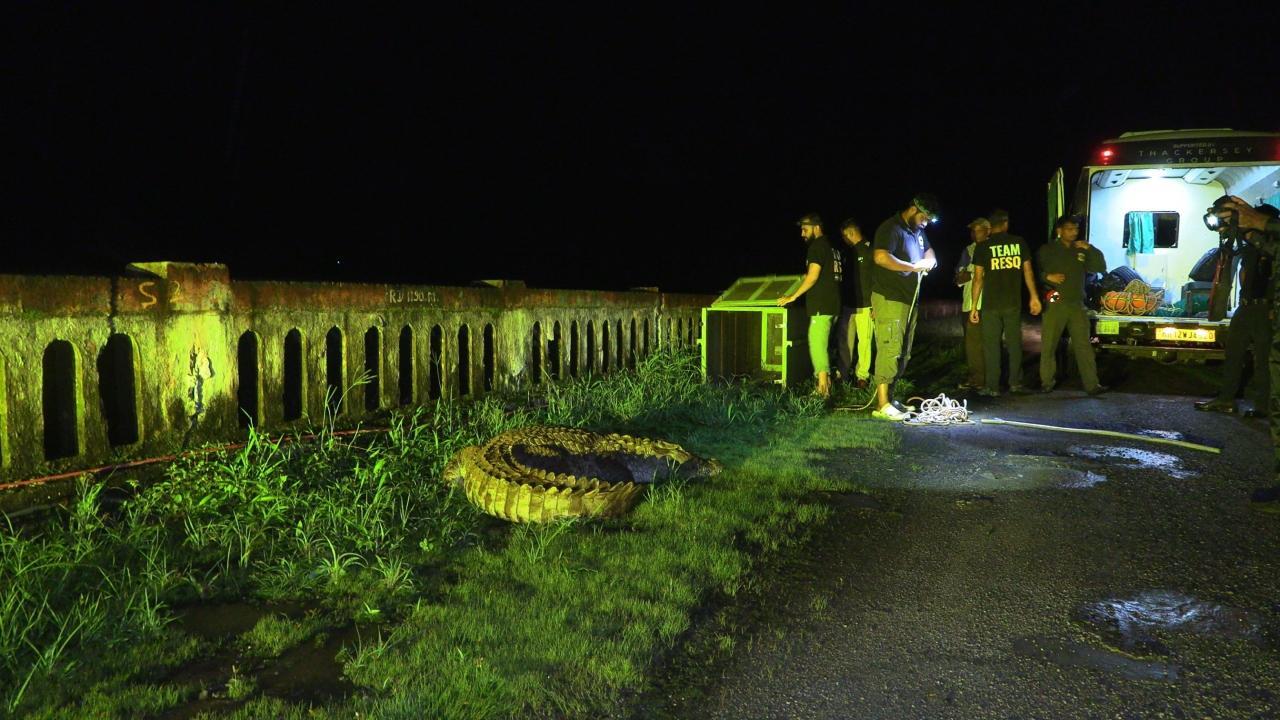After receiving the information about the Crocodile, Range Forest Officer (RFO) Govind Langute, contacted the rescue team from RESQ Charitable Trust to handle the situation

Crocodile was safely guided back to its natural habitat in Pune by Forest Department and RESQ CT Team. Pic/ResQ Charitable Trust
In an unexpected incident on Tuesday night near Varasgaon in Maharashtra's Pune, a crocodile sighting alarmed security guards, prompting immediate action.
The guards swiftly notified the Forest Department, which, with the assistance of RESQ Charitable Trust, successfully rescued and safely returned the crocodile to its natural habitat, an official said.
After receiving the information about the Crocodile, Range Forest Officer (RFO) Govind Langute, contacted the rescue team from RESQ Charitable Trust to handle the situation.
The RESQ team, comprising Sonesh Ingole, Naresh Chandak, Sagar Shinde, Ketan Vaidya, and Shubham Singh, responded promptly and arrived at the scene. Upon arrival, they carefully assessed the situation to ensure the safety of both the animal and the public.
“The safety of both wildlife and the public is our top priority,” said Sonesh Ingole, a member of the RESQ Team. “We assessed the situation carefully and successfully captured the crocodile without incident. Our primary aim was to ensure its safe return to its natural habitat.”
It is known that there are crocodiles in Varasgaon; however, there has been no history of conflict with the local community. The sighting amid Pune rains and subsequent rescue highlight the importance of continued vigilance and swift action to maintain this peaceful coexistence.
The team initially attempted to provide a safe passage for the crocodile to return to the water. However, a wall obstructed the crocodile's path, making it impossible for her to cross. Understanding the need for immediate action, the rescue team skillfully captured the crocodile and safely lured her into a transport box.
The crocodile was then released back into the waters, where she can continue to thrive in her natural habitat. This successful rescue underscores the importance of coordination between the Forest Department and wildlife rescue teams in ensuring the safety and well being of both humans and animals. The crocodile was transported securely in a large crate and released back into the dam at approximately 2:20 am, with RFO Langute present. “The effective coordination between the Forest Department and our team was essential in resolving this situation efficiently,” added Ingole.
The marsh crocodile, also called the mugger crocodile (crocodylus palustris), is native to the Indian subcontinent, Myanmar and some parts of Iran. It is commonly found in freshwater environments such as rivers, lakes, hill streams, village ponds and human-made reservoirs.
At one point, mugger crocodiles used to be ubiquitous throughout the subcontinent, but over time, their populations have dwindled due to habitat destruction, hunting, loss of prey base, human encroachment and increasing conflict situation
 Subscribe today by clicking the link and stay updated with the latest news!" Click here!
Subscribe today by clicking the link and stay updated with the latest news!" Click here!










